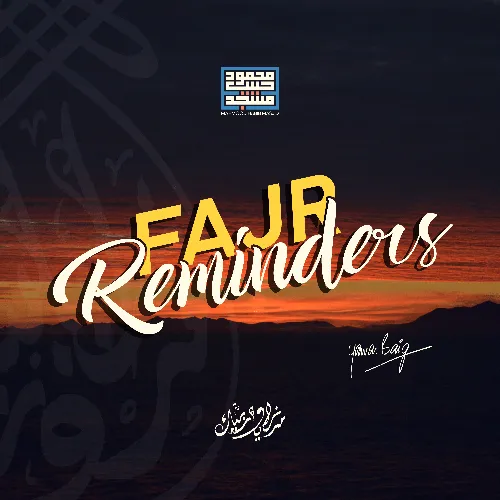Why is dua not accepted – 4
- Author
- Fajr Reminders - Mahmood Habib Masjid and Islamic Center
- Published
- Thu 24 Jul 2025
- Episode Link
- https://mhmic.org/fajrreminders/why-is-dua-not-accepted-4/
Auto-generated transcript:In the name of Allah, the Most Gracious, the Most Merciful.
All praise is due to Allah, Lord of the worlds.
And peace and blessings be upon the noble Prophet and the messengers.
Muhammad, the Messenger of Allah, may peace and blessings be upon him,
and upon his family and companions.
Tasliman kathiran kathira.
After that, my brothers and sisters, we are talking about
the advice that Ibrahim Adham,
Rahmatullah Ali, gave to the people of Basra.
What he said to them when they asked him
why their duas are not accepted.
And as I mentioned before, he enumerated ten reasons
why their duas were not accepted.
We have looked at the first two,
which is, he said,
you have known Allah,
but you do not fulfill the rights of Allah.
And the second thing he said is
that
you have,
you read and recite the book of Allah,
but you do not act upon it.
You do not act according to it.
The third one he said is,
you claim to love Rasulullah,
but you abandon his sunnah.
Just think about this.
In many countries,
they celebrate the birthday of Rasulullah.
So first and foremost,
they celebrate the birthday of Rasulullah
on a particular day.
It doesn't matter which day it is.
On a particular day,
usually they do it on the 12th or Abiyul Awal,
on a particular day,
and as a function,
and, you know,
people gathering together and reading
Naath and Nasheed and whatnot,
reciting and then giving speeches.
That itself is wrong.
It is not the sunnah.
Rasulullah never did it.
He never told anyone to do it.
The Khulafa Rashidin didn't do it.
None of the Sahaba did it.
It is something that was started by the Fatimi Khulafa,
the Fatimi dynasty,
the Shia dynasty in Egypt,
300 years after Rasulullah passed away.
So first of all,
this is a,
let me give you the historical data on this.
So celebrating Miladun Nabi is completely and totally against,
the sunnah of Rasulullah .
Data part,
if you think about,
if you just look on the stages of people who are celebrating this,
this event,
we don't even know which date he was born.
So anyway,
in that name,
every time I have looked,
I have seen the majority of them are people who do not have beards.
The beard was the sunnah of Rasulullah .
So how ironic.
That you claim to love Rasulullah ,
you will sing a Nasheed in praise of the Nabi ,
but you will not follow his sunnah with regard to his appearance.
Your day begins with the manhus,
with the,
with the,
with the,
with the,
nahusat of shaving your face,
of taking away the sign of Rasulullah sunnah from your face.
Your day begins with that.
How ironic is that?
Right?
Now think about this.
Allah told us why he sent Rasulullah .
And he called the Rasulullah his blessing,
his ni'mah.
Allah said in Zawah Al-Imran,
لَقَدْ مَنَّ اللَّهُ عَلَى الْمُؤْمِنِينَ إِذْ بَعْسَ فِيهِمْ رَسُولًا مِّنْ أَنفُسِهِمْ
يَتْلُوْا عَلَيْهِمْ آيَاتِهِ وَيُزَكِّيهِمْ وَيُعَلِّمُهُمُ الْكِتَابَ وَالْحِكْمَةَ وَإِنْ كَانُوا مِنْ قَبْلُ لَفِي ضَلَالٍ مُّبِينٍ
Allah said,
Indeed, Allah has done the believers a great favor by raising a messenger from among them,
reciting to them his revelations,
purifying them and teaching them the book and wisdom.
For indeed, they had previously been clearly astray.
Think about this.
Allah called not the Qur'an,
but the teacher of the Qur'an as a special blessing, as his ni'mah on the believers.
And he emphasized that in two ways.
One, by using the word لَقَدْ, surely indeed.
And by how he ended the ayah by saying,
وَإِنْ كَانُوا مِنْ قَبْلُ لَفِي ضَلَالٍ مُّبِينٍ
For indeed, they had previously been clearly astray.
The Qur'an obviously is a ni'mah of Allah.
It is a ni'mah of Allah.
Islam itself is a ni'mah of Allah.
But the reason Allah is calling Rasulullah the special ni'mah
and not calling the Qur'an the ni'mah
is because the Qur'an is locked.
It's like a chest of,
which is full of precious jewels,
but it needs a key to be opened
for you to access them.
And that key is Muhammad .
Without that key,
the rest of, full of jewels cannot be accessed.
